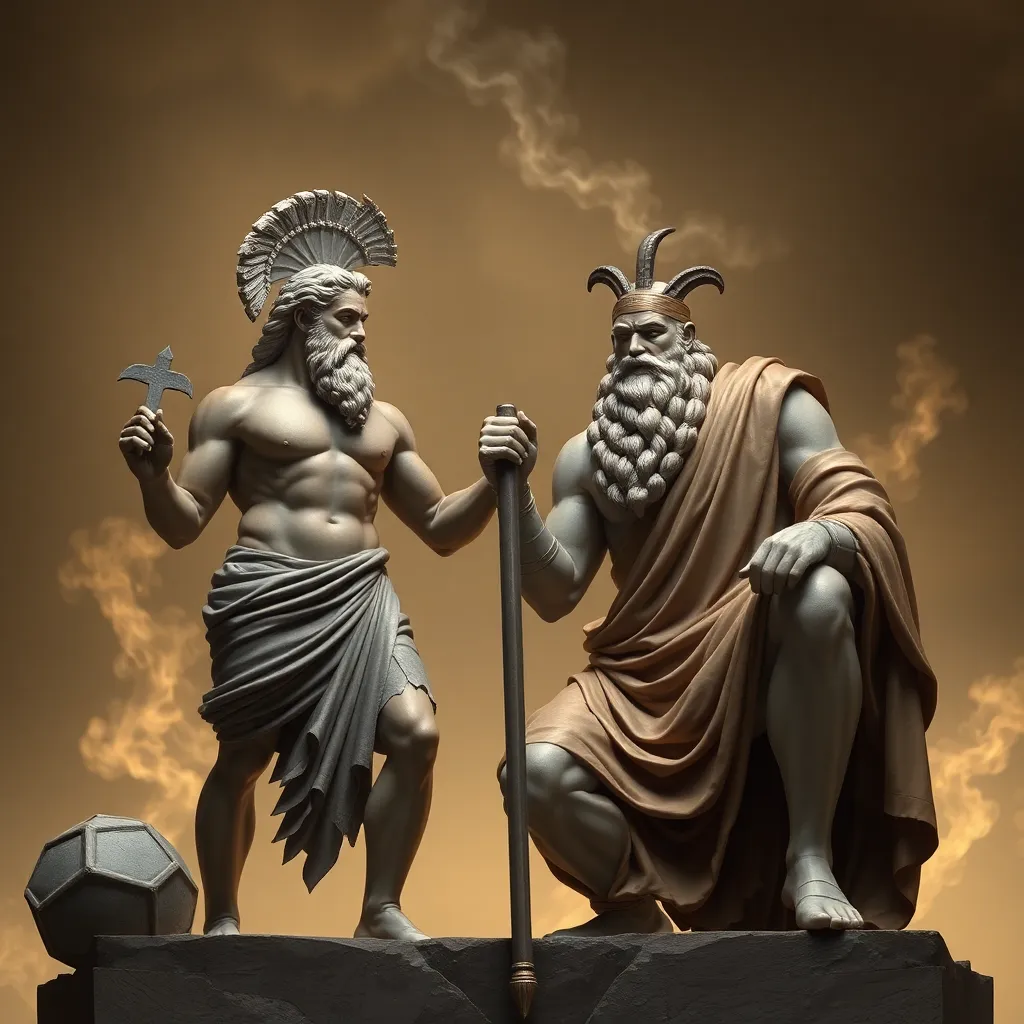Heracles’ Relationship with His Father Zeus: A Complex Dynamic
I. Introduction
Heracles, one of the most celebrated heroes in Greek mythology, embodies the struggle between humanity and divinity. Renowned for his incredible strength and numerous adventures, his life story is intertwined with that of his father, Zeus, the king of the gods. The relationship between Heracles and Zeus is multifaceted, marked by divine favor, jealousy, and the quest for personal identity. This article aims to explore the complexities of their relationship, shedding light on the intricate dynamics of fatherhood in the realm of mythology.
II. The Birth of Heracles: A Divine Conception
The circumstances surrounding Heracles’ birth are both extraordinary and tragic. He was born to Zeus and Alcmene, a mortal woman, during a night when Zeus took the form of her husband, Amphitryon. This divine union resulted in the birth of Heracles, but it also set the stage for a tumultuous relationship.
- Zeus’ Infidelity: Zeus’ actions led to a series of conflicts, as he often engaged in affairs with mortal women, igniting the jealousy of his wife, Hera.
- Hera’s Jealousy: Hera’s wrath was particularly directed at Heracles due to his status as a demi-god and her husband’s infidelity. She sought to undermine Heracles from the very start of his life, viewing him as a rival to her own children.
III. Heracles’ Early Life: Struggles and Challenges
Heracles’ early life was marked by significant challenges, largely influenced by the actions of both his divine father and his spiteful stepmother.
- Trials in Childhood: As a child, Heracles faced numerous trials, including the infamous incident where Hera sent two serpents to kill him in his crib. Heracles, even as an infant, displayed remarkable strength by killing the serpents.
- Zeus’ Influence: Despite the obstacles, Zeus did provide guidance and a sense of protection, albeit indirectly, which shaped Heracles’ character.
- Hera’s Undermining: Throughout his childhood, Hera continued to create obstacles for Heracles, leading to a life filled with adversity.
IV. The Twelve Labors: A Test of Strength and Identity
The Twelve Labors of Heracles stand as a testament to his strength and resilience, but they also reflect the tumultuous nature of his relationship with Zeus.
- Origin of the Labors: The Labors were assigned to Heracles as a punishment for a fit of madness inflicted upon him by Hera, resulting in the tragic killing of his own wife and children.
- Zeus’ Role: While the Labors were a form of punishment, Zeus ultimately played a role in aiding Heracles in his quest for redemption, showcasing the complexity of their bond.
- Symbolism: Each Labor symbolizes not only physical strength but also the internal struggle Heracles faced in reconciling his dual nature as both a god and a man.
V. Moments of Support: Zeus as a Protector
Despite the conflicts, there were pivotal moments where Zeus acted as a protector and guide for Heracles.
- Divine Aid: There are several instances in myths where Zeus intervenes to help Heracles, such as providing him with the strength to defeat formidable foes.
- Significance of Intervention: These moments of divine assistance highlight the duality of Zeus’ role as both father and king, providing a safety net during Heracles’ most challenging times.
- Conflict Amidst Support: The complexity of their relationship is evident in how Zeus’ support often came amidst the turmoil caused by Hera’s jealousy.
VI. Conflicts and Resentments: The Strain of Expectations
Heracles’ perception of Zeus was fraught with tension and resentment, stemming from the overwhelming expectations placed upon him as a demi-god.
- Favoritism: Heracles often felt overshadowed by Zeus’ other offspring, which led to feelings of inadequacy and resentment towards his father.
- Emotional Turmoil: The emotional conflicts between Heracles and Zeus mirror those of many father-son relationships, marked by a desire for approval and understanding.
- Comparative Analysis: Comparing their relationship to other father-son dynamics in mythology, such as that of Cronus and Zeus, reveals a pattern of conflict and resolution.
VII. Redemption and Reconciliation: The Evolution of Their Bond
As Heracles matured, his relationship with Zeus evolved, leading to moments of redemption and reconciliation.
- Acceptance of Heritage: Over time, Heracles came to accept his heritage and the complexities of being a demi-god, forging a more profound connection with Zeus.
- Recognition of Worth: Zeus, in turn, recognized Heracles’ strength and bravery, acknowledging his son’s accomplishments and sacrifices.
- Narrative Arc: Their journey from conflict to reconciliation reflects a powerful narrative arc, emphasizing growth and understanding within familial bonds.
VIII. Conclusion
In summary, the relationship between Heracles and Zeus is a rich tapestry of complexity, marked by divine favor, jealousy, and emotional turmoil. Their dynamic serves as a reflection of broader themes of father-son relationships in mythology, illustrating the universal struggle for acceptance and understanding. The legacy of Heracles and Zeus endures in cultural history, reminding us of the intricate connections that define our lives, both mortal and divine.




